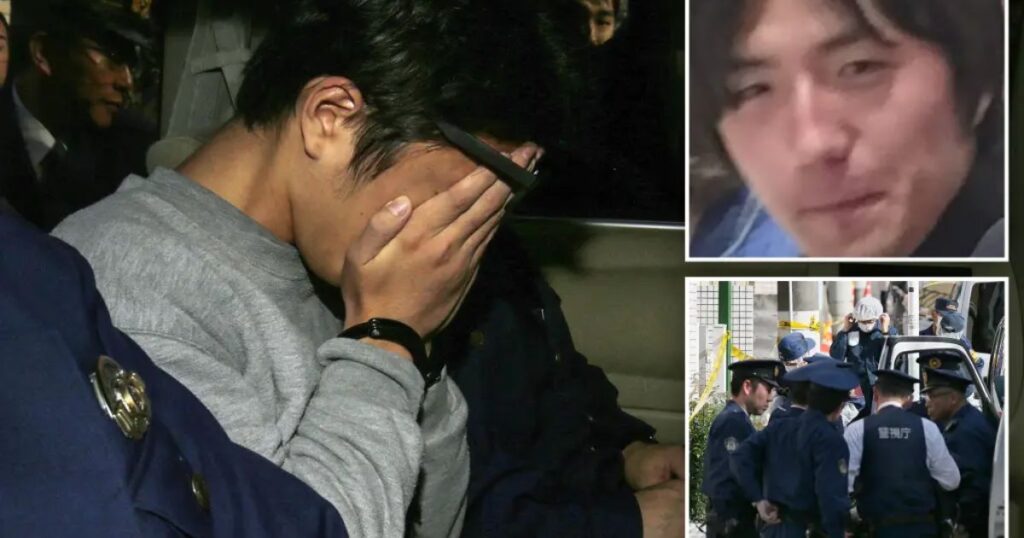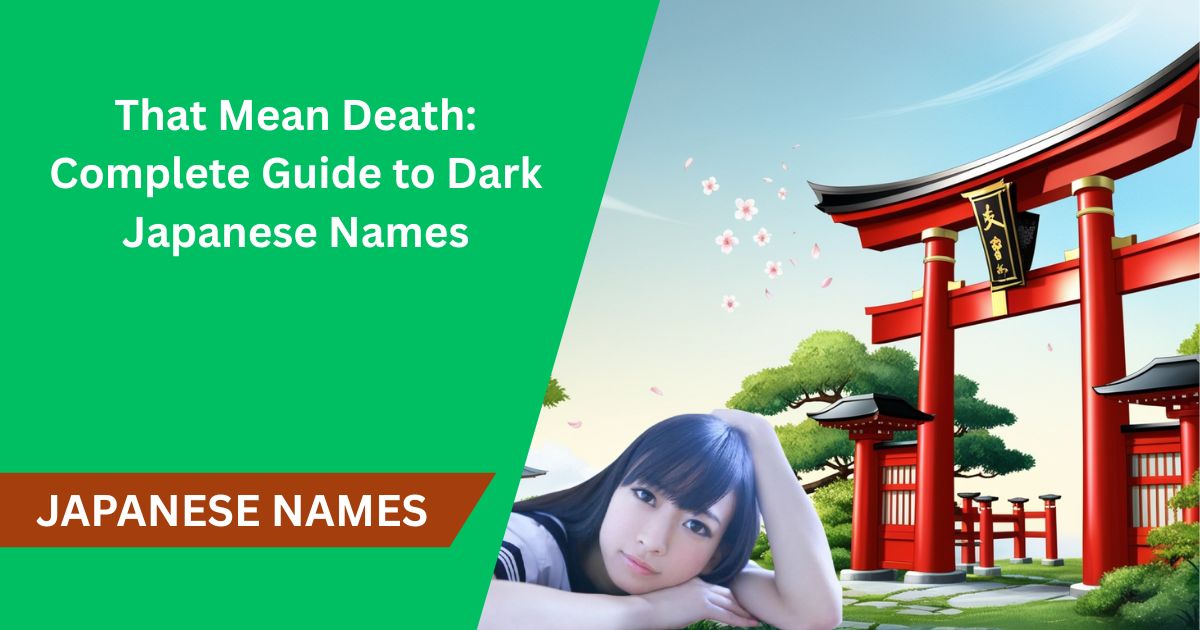Japanese culture holds deep respect for life’s natural cycles, including death and rebirth concepts. These best Japanese names that mean death carry profound spiritual meanings rooted in Buddhist and Shinto traditions.
Parents seeking Japanese names with dark meanings often find beauty in names symbolizing mortality, transformation, and the afterlife. This guide explores traditional Japanese death names spanning centuries of cultural heritage.
Traditional Japanese Death Names from Ancient Literature
Ancient Japanese literature provides rich sources for names connected to mortality and spiritual transformation. These traditional selections reflect deep cultural understanding of life’s transient nature.
Kurami (暗美) – Dark beauty combining shadow with elegance
Shiemi (詩映美) – Poetic reflection of beauty in darkness
Yuumei (夕冥) – Evening darkness representing life’s twilight
Reika (霊火) – Spirit flame connecting earthly and spiritual realms
Higan (彼岸) – The other shore in Buddhist afterlife concepts
Mayoi (迷い) – Lost soul wandering between worlds
Rinshi (凛死) – Dignified death with honor and respect
Sayeka (冴夜香) – Clear night fragrance evoking peaceful passing
Tomurai (弔) – Mourning and remembrance of departed souls
Yomigaeri (蘇り) – Resurrection and return from death
Enma (閻魔) – Judge of the dead in Buddhist mythology
Kogare (焦がれ) – Burning desire transcending mortal bounds
Shizuka (静香) – Peaceful silence of eternal rest
Meishi (冥詩) – Poetry of the underworld and darkness
Kasumi (霞) – Mist representing the veil between life and death
Popular Japanese Boy Names that Mean Death and Their Meanings

Japanese boy names that mean death often emphasize strength, honor, and spiritual power. These best Japanese names that mean death for boy children reflect masculine qualities associated with protection and guidance.
Ankoku (暗黒) – Complete darkness representing the void
Shiin (死陰) – Shadow of death with protective qualities
Kuroi (黒井) – Black well symbolizing deep mysteries
Meifu (冥府) – Underworld realm of spirits and ancestors
Reishi (霊死) – Spiritual death and transformation
Yami (闇) – Darkness that conceals and protects
Bohyou (墓標) – Grave marker honoring the departed
Kuchiki (朽木) – Decaying wood representing natural cycles
Shuen (終焉) – Final end with dignity and completion
Higanbana (彼岸花) – Red spider lily blooming at death’s door
Ryoumen (両面) – Two faces representing life and death
Sairei (再霊) – Returning spirit seeking peace
Todori (届) – Reaching across the divide between worlds
Makoto (誠) – Truth revealed through mortality’s lessons
Ikiryou (生霊) – Living spirit with supernatural power
Beautiful Japanese Girl Names that Mean Death and Darkness

Japanese girl names meaning death often emphasize grace, beauty, and spiritual enlightenment. These best Japanese names that mean death girl selections combine feminine elegance with profound spiritual concepts.
Kurami (暗美) – Dark beauty transcending mortal understanding
Shiemi (詩映美) – Poetic beauty reflected in shadow
Yuumei (夕冥) – Twilight darkness bringing peaceful rest
Reika (霊火) – Sacred flame guiding souls to afterlife
Higan (彼岸) – Buddhist paradise beyond death’s river
Kie (希枝) – Rare branch reaching toward eternity
Mayoi (迷い) – Beautiful confusion between worlds
Rinshi (凛死) – Noble death with grace and honor
Sayeka (冴夜香) – Night fragrance carrying prayers upward
Tomurai (弔) – Gentle mourning for beloved departed
Yomigaeri (蘇り) – Graceful return from death’s embrace
Enma (閻魔) – Divine judge showing mercy to souls
Kogare (焦がれ) – Passionate longing beyond death’s boundary
Shizuka (静香) – Peaceful silence of eternal gardens
Meishi (冥詩) – Dark poetry expressing soul’s journey
Unisex Japanese Names that Mean Death for Any Gender
Gender-neutral Japanese death names offer flexibility while maintaining deep spiritual significance. These names work beautifully for any child while honoring Japanese naming traditions about death.
Kageki (影棄) – Abandoned shadow seeking new purpose
Shiokaze (潮風) – Ocean breeze carrying souls to rest
Nemuri (眠り) – Peaceful sleep transcending mortal concerns
Kasumi (霞) – Morning mist concealing spiritual mysteries
Reikon (霊魂) – Pure soul journeying through existence
Yuuyami (夕闇) – Evening darkness bringing comfort
Kiri (霧) – Fog representing transition between worlds
Shinon (死の音) – Sound of death’s gentle approach
Mangetsu (満月) – Full moon illuminating death’s pathway
Saihate (最果て) – World’s end where spirits gather
Hakanai (儚い) – Fleeting existence teaching life’s value
Shiawase (死合わせ) – Death bringing unexpected happiness
Kokoro (心) – Heart continuing beyond physical death
Tsumi (罪) – Sin requiring spiritual purification
Sayonara (さよなら) – Farewell spoken with love and hope
Japanese Death Names from Mythology and Folklore

Legendary Japanese names that mean death from ancient stories carry powerful mythological connections. These selections draw from centuries of folklore about spirits, demons, and supernatural beings.
Seiran (青嵐) – Blue storm bringing change and renewal
Kurayami (暗闇) – Complete darkness hiding ancient secrets
Shinigami (死神) – Death god guiding souls peacefully
Hotaru (蛍) – Firefly representing departed souls’ light
Tsukikage (月影) – Moon shadow revealing hidden truths
Ranshou (乱昇) – Chaotic ascension to higher realms
Komorebi (木漏れ日) – Sunlight filtering through death’s forest
Yoru (夜) – Night providing rest for weary spirits
Shijima (静寂) – Profound silence of enlightenment
Kage (影) – Shadow protecting souls during transition
Mugen (夢幻) – Infinite dreams beyond mortal understanding
Soushi (葬詩) – Funeral poetry honoring the departed
Hakai (破壊) – Destruction necessary for rebirth
Kenshin (見真) – Seeing truth through death’s revelation
Yamiyo (闇夜) – Dark night concealing spiritual transformation
How to Choose Japanese Names that Mean Death Responsibly
Selecting Japanese death names requires understanding cultural context and spiritual significance. These names connect children to profound concepts of mortality, spirituality, and life’s natural cycles.
Ankoku (暗黒) – Representing complete darkness and mystery
Shiin (死陰) – Combining death with protective shadow
Kuroi (黒井) – Black well symbolizing hidden depths
Meifu (冥府) – Underworld realm of spiritual beings
Reishi (霊死) – Death leading to spiritual awakening
Yami (闇) – Darkness providing shelter and rest
Bohyou (墓標) – Memorial marker honoring ancestors
Kuchiki (朽木) – Natural decay teaching life’s lessons
Shuen (終焉) – Dignified ending with spiritual purpose
Higanbana (彼岸花) – Sacred flower marking seasonal transitions
Ryoumen (両面) – Dual nature of existence and ending
Sairei (再霊) – Spirit returning with wisdom
Todori (届) – Reaching beyond mortal limitations
Makoto (誠) – Truth discovered through mortality
Ikiryou (生霊) – Living spirit with eternal qualities
Japanese Death Names in Popular Culture and Anime

Famous Japanese death names from manga and television demonstrate how these concepts appear in modern storytelling. Popular culture continues celebrating these traditional naming themes.
Kurami (暗美) – Dark beauty featured in supernatural anime
Shiemi (詩映美) – Poetic character representing life’s fragility
Yuumei (夕冥) – Twilight character bridging worlds
Reika (霊火) – Spirit flame character with protective powers
Higan (彼岸) – Character connected to afterlife journeys
Mayoi (迷い) – Lost character seeking spiritual purpose
Rinshi (凛死) – Noble character facing death bravely
Sayeka (冴夜香) – Night character bringing peace
Tomurai (弔) – Mourning character honoring the dead
Yomigaeri (蘇り) – Resurrection character returning transformed
Enma (閻魔) – Judge character maintaining cosmic balance
Kogare (焦がれ) – Passionate character transcending mortality
Shizuka (静香) – Peaceful character teaching acceptance
Meishi (冥詩) – Dark poet character expressing soul’s journey
Kasumi (霞) – Mist character representing transition periods
Pronunciation Guide for Japanese Names that Mean Death
Proper pronunciation honors these sacred names and their cultural significance. Understanding correct pronunciation shows respect for Japanese naming traditions about death and spirituality.
Kageki (影棄) – KAH-geh-kee with gentle emphasis
Shiokaze (潮風) – SHEE-oh-kah-zeh flowing like ocean breeze
Nemuri (眠り) – NEH-moo-ree soft like peaceful sleep
Kasumi (霞) – KAH-soo-mee light like morning mist
Reikon (霊魂) – REH-ee-kohn with spiritual reverence
Yuuyami (夕闇) – YOO-yah-mee gentle like evening darkness
Kiri (霧) – KEE-ree simple like fog’s whisper
Shinon (死の音) – SHEE-nohn representing death’s sound
Mangetsu (満月) – MAHN-geh-tsoo full like moon’s light
Saihate (最果て) – SAH-ee-hah-teh distant like world’s end
Hakanai (儚い) – HAH-kah-nah-ee fleeting like cherry blossoms
Shiawase (死合わせ) – SHEE-ah-wah-seh complex emotional meaning
Kokoro (心) – KOH-koh-roh deep like heart’s truth
Tsumi (罪) – TSOO-mee heavy with spiritual weight
Sayonara (さよなら) – SAH-yoh-nah-rah farewell with love
Conclusion
These best Japanese names that mean death offer profound connections to spiritual traditions and cultural wisdom. Japanese names with dark meanings provide beautiful options for parents seeking names reflecting life’s deeper mysteries.
Whether choosing Japanese names that mean death or darkness for boys, girls, or unisex selections, each carries centuries of cultural significance. These names honor mortality’s role in spiritual growth while celebrating the eternal nature of the human soul through traditional Japanese naming practices.

